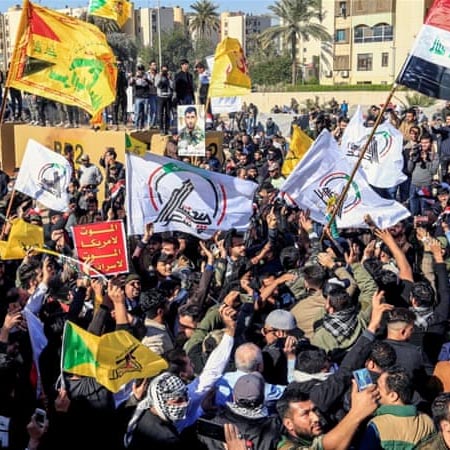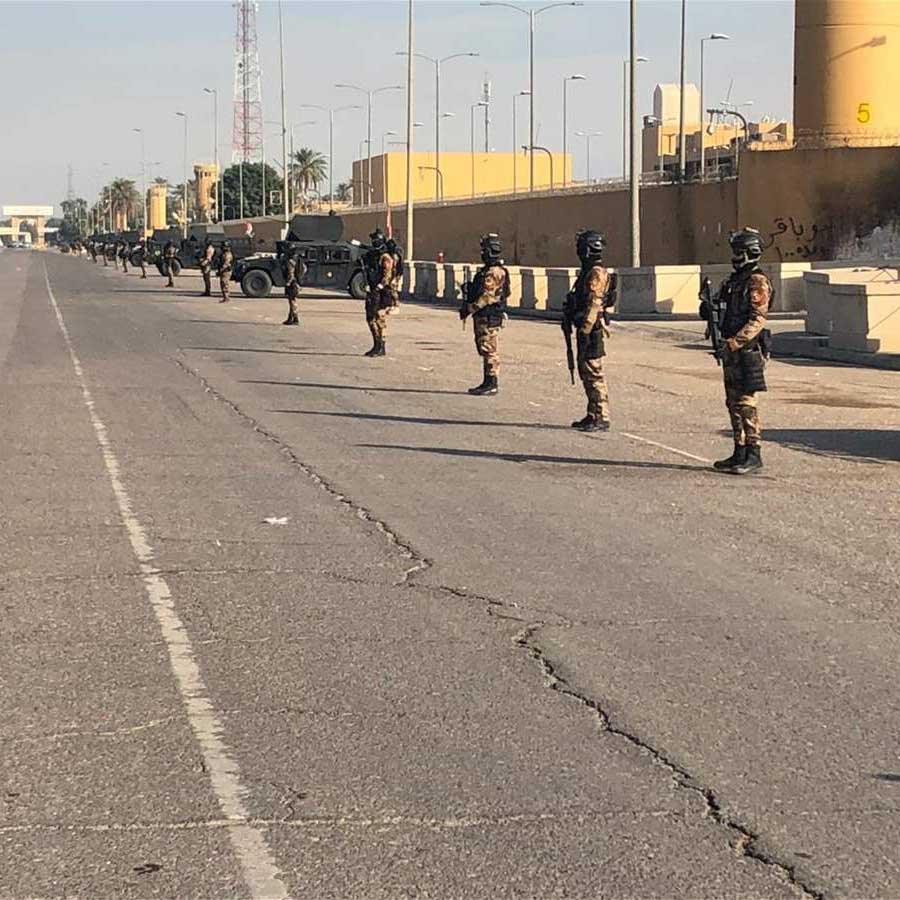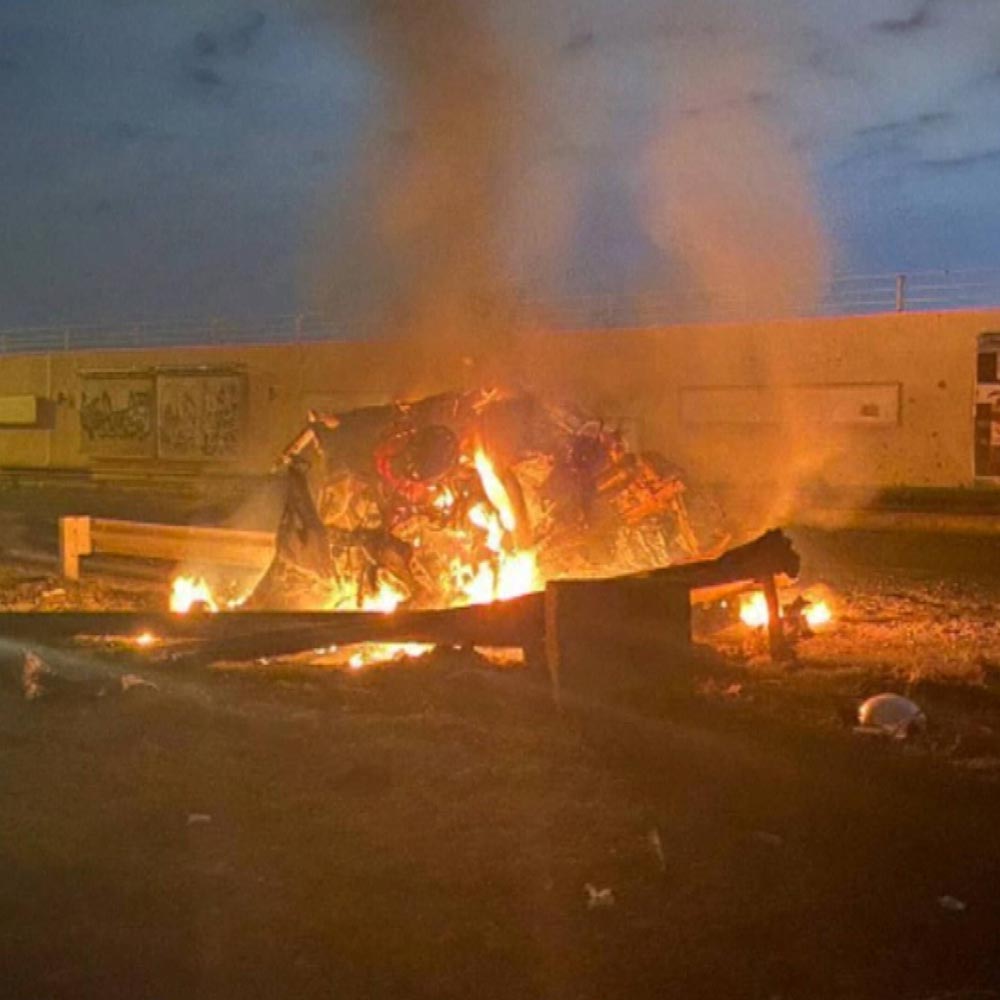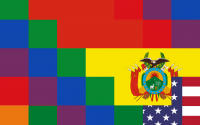Iraq // Before and after the assassination of Soleimani and Mahdi~ 12 min
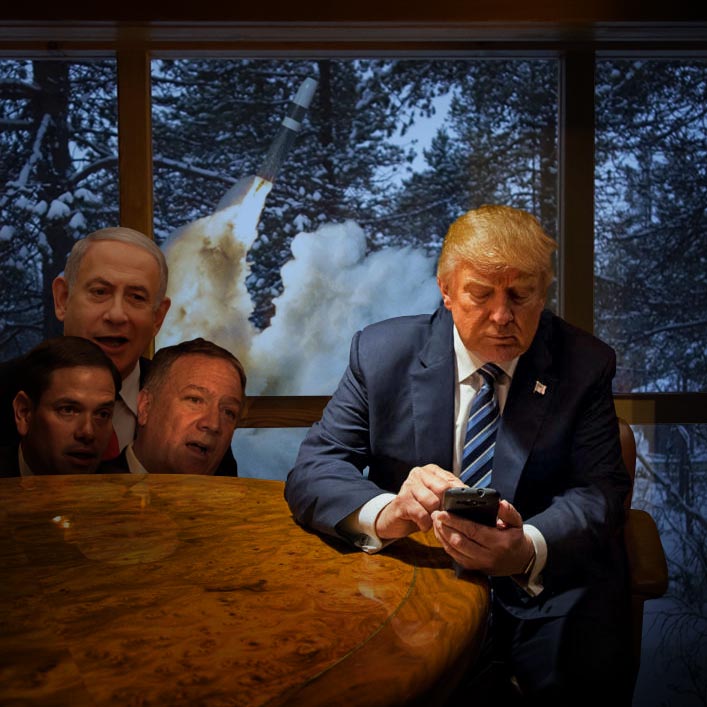
By Duarte Guerreiro and Francisco Norega
Over the last week, we have witnessed a frenzied succession of events that might easily lead to a new and bloody conflict in the Middle East. The news coming from that side of the world, for most of us far away both in distance and in understanding, are full of references, abbreviations and names that are strange to us. In this article we try to make some sense out of the recent events in Iraq.
Key players
The Popular Mobilization Forces (PMF) are an organization made up of about 40 militias, mostly Shia groups, but of which are also part between 15 and 40 thousands Sunni fighters, as well as Christians and Yezidi individuals. It is therefore a multi-confessional organization. It exists as an organization since 2014 and was present in just about all major battles against ISIS in Iraq. Since 2016, they are formally part of the Iraqi army.
The Kata’ib Hezbollah are a Shia paramilitary group active since 2003. They are part of the PMF and therefore also of the Iraqi army, and receive direct support from Iran. During the Iraqi War, the group fought the occupation forces led by the US. During the Syria and Iraq civil wars, they fought against ISIS and the Free Syrian Army.
The Quds Force are part of the Islamic Revolutionary Guard Corps (IRGC), a branch of the Iranian army. It is specialized in extraterritorial unconventional operations, somewhat similar to the US Special Operations Forces.
Since the beginning of the war on ISIS, while the West closed its eyes and waited for the conflict to cause the balkanization of Syria and create more instability in Iraq, in order to make billions from oil and arms sales, the Quds Forces were on the ground in both countries. They gave military support to forces fighting against the jihadi savagery. The Kata’ib Hezbollah are their main allies in Iraq.
Sequence of events
On December 29th 2019, the US launched several airstrikes against Kata’ib Hezbollah bases in Syria and Iraq. 25 people were killed and more than 50 wounded.
According to the Pentagon, this was a retaliation for an attack against an army base in Kirkuk (northern Iraq) two days earlier in which an American contractor was killed and six people were wounded (two Iraqi soldiers and four Americans).
The US blamed Kata’ib Hezbollah for the attack, even though the group has not claimed responsibility. Considering that Kirkuk is not a Shia area, the odds of this group having carried out the attack are somewhat low. But even assuming that they are indeed responsible for it, the disproportionality of the response is clear. According to the Iraqi prime-minister these attacks amount to a “violation of Iraq’s sovereignty and a threat to the security of Iraq and the region”.
On December 31st, hundreds pf protesters with flags from the PMF and Kata’ib Hezbollah gathered at the US embassy in Baghdad, on the highly fortified “Green Zone” where the Americans hunkered down, chanting slogans against the US and Israel.
The crowd stormed the main gate of the embassy and, according to several reports, threw stones against the doors of the building. Protesters invaded at least one room on the reception area and parts of the wall protecting the complex were set on fire.
American forces answered with tear gas and three snipers were spotted on the roofs of the building but no live ammunition was fired. Iraqi forces intervened, creating a um cordon between the crowds and the building. The next day, the protesters left. The PMF stated that around 20 people were injured while the US Defense Secretary assured that no embassy personnel suffered injuries.
A distinction should be made between these actions and the protest movements that rage across the country since the beginning of October. The crowds on Tahrir Square, who protest the economic situation, the political elites and the militias, have distanced themselves from this protest.
These saw Soleimani in a negative light, due to suspicions that he had been one of the main proponents of the violent response to the Tahrir protests.
The US answer came soon after. On the night of January 2nd, American missiles struck two vehicles in the vicinity of Baghdad’s International Airport. 10 people died in the attack, among them Qassem Soleimani, leader of the Quds Force, Abu Mahdi al-Muhandis, second-in-command of the PMF and leader of the Kata’ib Hezbollah, and Muhammad Reza Al-Jabri, public relations director of the PMF.
The murder of two key figures of the fight against ISIS, without any contact with the Iraqi government and forces, amounts to a diplomatic atrocity and a complete violation of Iraqi sovereignty and of international law. Let us imagine that someone on the long US “most wanted” list visits France. Seizing the opportunity, without warning, American “allies” bomb the Paris Airport.
It’s useful to remember that American forces are in Iraq under the pretext of fighting ISIS, following the 2014 invitation of the Iraqi government, unlike what happens in Syria, where their presence is completely illegal.
Donald Trump, from high atop his cybernetic throne, gloated that he was the one to order the death of Soleimani, which he called “the world’s number 1 terrorist”. But these actions are everything but consensual, even on the international stage and among US allies.
Emmanuel Macron, for example, phoned the Iraqi prime-minister to express support for the country’s sovereignty, implicitly rebuking the strike, while a former MI6 chief described Soleimani’s murder as an “act of war”. When we end up agreeing with the former chief of an imperialist secret service, something is very wrong.
The assassination of the commander of one of the most important forces on the Iraqi army is obviously disrespectful towards that same invitation and its consequences are highly unpredictable. The same can be said of the assassination of one of the top figures of the Iranian State.
Destroying these two men, beloved as heroes by the populations rescued from Salafist fanaticism (not only in Iran and Iraq, but also in Syria), in the same explosive hell will only have the effect of bringing the Iraqi and Iranian people even closer together and reducing the sectarian hate that the USA has done so much to promote, now replaced by hatred of the common enemy which has brought so much misery to the region.
Making the attack even stupider, killing them will do nothing to change anything. Their missions were fulfilled, their ideas now part of their institutions. All they needed was martyrdom to rise to the status of legends. The USA did them the favor.
Over the following days, threats were exchanged between sides. An IRGC commander stated that Iran reserves the right to avenge Soleimani’s death and that “35 American targets on the region are within its reach”. Trump, on the other hand, says the American army has identified “52 sites (…) [of] high level & important to Iran & the Iranian culture” which, in case Iran decides to retaliate, will be attacked “VERY FAST AND VERY HARD” (just like that, in ALL CAPS).

Iran is not known to carry out, on the geopolitical domain, rash actions which may jeopardize its security and legitimacy. There is therefore little probability that it will carry out attacks similar to those the US has accustomed us to. It’s more likely that they will work to insure and strengthen their positions and those of their allies in the region, waiting for some slip-up from the other side which will allow the legitimate and legal use of force, from the point of view of international law.
On the other hand, the situation in Iraq, a territory ravaged by several wars and conflicts over the last two decades, is highly unstable. On January 4th, there were reports that at least one rocket has landed close to the American embassy on Baghdad’s “Green Zone”, damaging the road that leads to it. Balad Air Base, which hosts American forces 70km north of the Iraqi capital, was also targeted by rockets. No victims were reported.
The Kata’ib Hezbollah have not claimed this attacks but, in the meantime, released a statement to local security forces, calling on people to stay at least 1km away from US bases and facilities housing American troops, starting from the night of January 5th.
Iraqi public opinion has been quite divided lately regarding the role of Iran and its allies on Iraqi internal political life. Nonetheless, considering these latest events, these questions have assumed a smaller role for the Iraqi people and their main forces. The huge crowds that gathered in Baghdad and other Iraqi cities to mourn the deaths of Mahdi and Soleimani, before the body of the later continued its journey to Iran, sent a clear message that they want an end to the US military presence in the country.
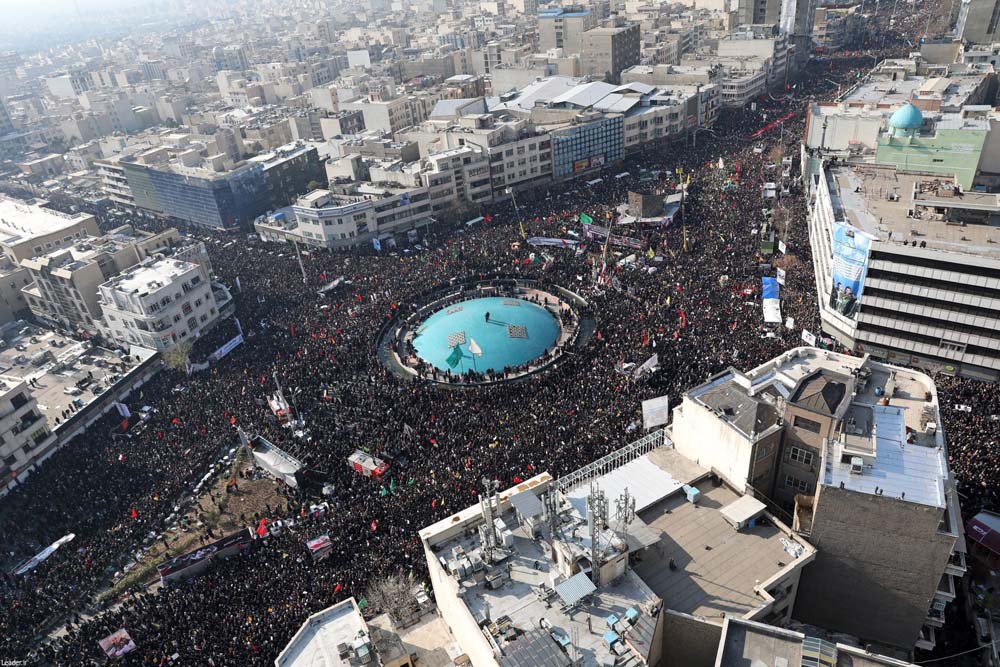
On Sunday, January 5th, the Iraqi parliament gathered for an extraordinary session to discuss an answer to the US actions. Even though around 150 Sunni and Kurdish MPs were absent, a resolution was approved by absolute majority urging the government to “work to end the presence of any foreign troops on Iraqi soil and prohibit them from using its land, airspace or water for any reason”.
The international coalition against ISIS has, in the meantime, suspended their operations on Iraqi soil, concentrating their efforts on protecting American, British and other western troops in the country.
The German Foreign Minister stated that Germany’s “overriding interest is that stability and unity in Iraq won’t fall victim to the recent escalation”, that they “will respect every decision” and that its military presence in Iraq would “only remain if the Iraqi government wanted it.”
Trump, however, acted like a brat as usual by saying that, in the event the US are invited to leave, “we will charge them sanctions like they’ve never seen before. It’ll make Iranian sanctions look somewhat tame” and that “We have a very extraordinarily expensive air base that’s there. It cost billions of dollars to build [and] we’re not leaving unless they pay us back for it”.
Why now?
“Patriotism is the last refuge of a scoundrel.” Just as Erdogan placed his bets on starting a war against the Kurds to secure his re-election on favorable terms (successfully), Trump seems to have bet on a similar move. Between the impeachment process and the constant scandals his administration finds itself involved in, starting a war is a move that rarely fails. It allows him to project an image of patriotic machismo and to accuse his opposition of cowardice. If it all ends with thousands of dead further ahead is of little consequence. After all, that’s how the whole tragedy in Iraq began, back in the days of Bush Junior.
There will be no lack of supporting voices in his administration and the State apparatus, fat as it is with neocons and profiteers who see in a war with Iran a golden opportunity to fill their pockets at the expense of innocent blood. They count on the support of the Saudi, Turkish and Israeli lobby, anxious to see the USA pay the costs of a conflict with their main regional enemy.

In the following days it will be important to keep an eye on how the media will try to sell us another act of imperialistic aggression. Soleimani is presented as a “bad guy” who liked to kill Americans just because, the same rhetoric previously used on the feeble minded with terminal brain poisoning caused by an excess of Fox News, that led to the destruction of Afghanistan, Iraq and Syria.
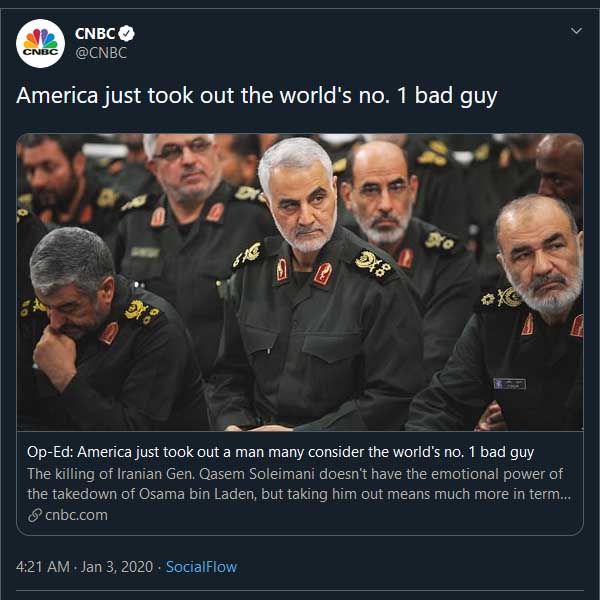
Where were these martyred Americans? Drinking cocktails on Florida beaches? Or occupying destroying and looting the land of others? Those who live by the sword, die by the sword.

